Campaign targets boozy Brits on the piste
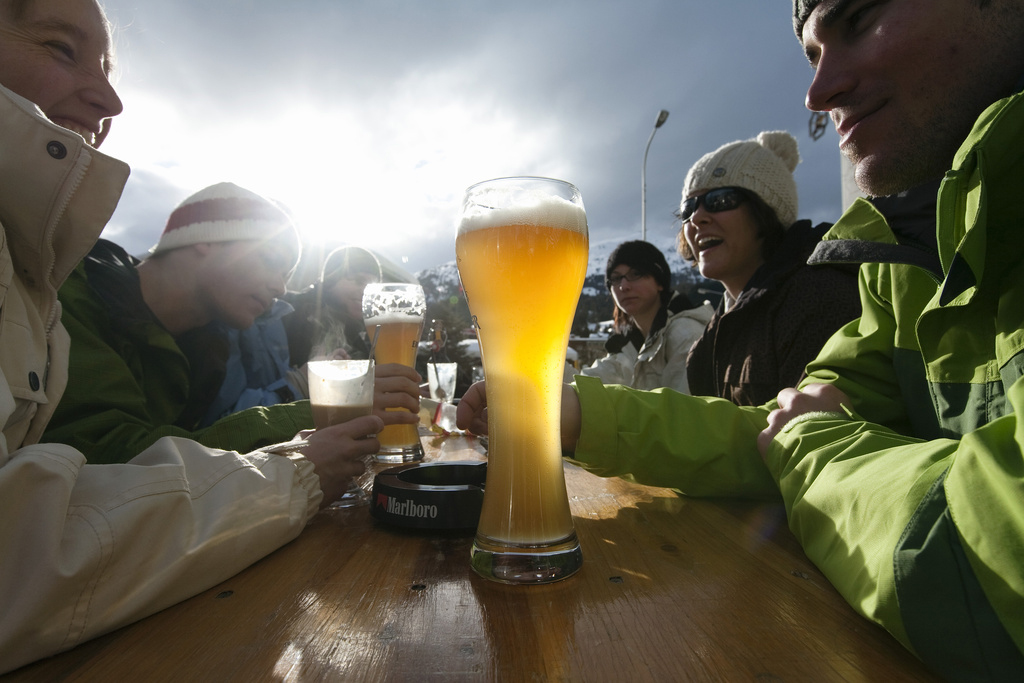
Mixing young Britons with “happy hours” and the hazardous Alps can prove to be a dangerous cocktail, warns a new British government safety campaign.
Posters with the slogan “Don’t catch your death” have been put up at Geneva airport and several Swiss ski resorts to raise awareness among British tourists of the risks of binge drinking on a skiing holiday. But Swiss resorts play down the problem.
“We’re not here to wave the finger, but to make people more aware of the dangers of drinking excessively in the mountains,” the vice-consul at the British Consulate General in Geneva told swissinfo.ch.
The initiative was jointly launched in Switzerland, France and Italy just before the Christmas holidays. In all, it targets one million British holidaymakers visiting the Alps this winter.
The Swiss campaign takes the form of posters in chalets and hotels in Verbier owned and operated by British tour operators, and at cable car stations and lifts at Wengen, Grindelwald and Mürren in the Jungfrau region. A number of posters are also visible when arriving at Geneva airport.
“It’s not a question of pinpointing places with problems but more a prevention issue, targeting places with large numbers of young British nationals who perhaps are not fully aware of the effects of low temperatures and how the body reacts to alcohol at altitude,” said the vice-consul.
The action, which was originally devised by the British consulate in Lyon, is supported by the Swiss and French police, tourist offices, British tour operators, Geneva airport and French airports in the Savoie, Haute Savoie, Isère and Rhône regions.
Series of incidents
The initial idea is said to have come about after a spate of drink-related deaths and serious accidents.
According to British diplomats, more than 30 Britons were involved in alpine accidents last year, half of whom were under 25. Many died because they underestimated the risk of drinking at high altitude.
A study published by the British foreign ministry in 2005 estimated a third of skiers and snowboarders under 25 had experienced problems abroad linked to a mixture of altitude, adrenaline and alcohol.
The latest campaign has been influenced by the death of British student Rachel Ward in January 2009 while on a student holiday to the French resort of Val d’Isère. The 20-year-old from Durham University died after she got lost on her way home, fell in a shallow river and succumbed to hypothermia.
More recently in Switzerland an autopsy on the body of British tourist Myles Robinson, 23, showed he was under “strong influence of alcohol” when he fell to his death down a 100-metre cliff in Wengen shortly before Christmas.
And only last week the entire ski resort of Morzine in France was out looking for a 16-year-old girl who got lost at 4am after a night out, the vice-consul recounted.
Consuming alcohol at altitude can make people feel drunk more quickly and when inebriated they are much less equipped to deal with the alpine conditions, especially the sub-zero temperatures, say the diplomats.
“Swiss people know how to deal with the mountains but people from the UK don’t understand the cold and how the body reacts at altitude,” said the vice-consul.
Not an issue
Swiss resorts under the spotlight largely rejected the notion that there was an alcohol problem with British holidaymakers, however.
“To my knowledge excessive drinking is not a problem in the resorts,” said Jurg Mosimann, spokesman for the Bernese cantonal police at Lauterbrunnen, which covers the Jungfrau region.
“We have to keep an eye out, but it’s not a big problem,” echoed Ursula Müllermann, deputy director of the Jungfrau region tourist office.
“Of course there are people in the streets when the bars are closed; that’s normal. And people have one beer too many on holidays, but it’s not excessive.”
The same message could be heard at Verbier.
“The British certainly have a reputation for drinking a lot, but I wouldn’t say they overdo it,” said one bar owner. “And it’s certainly not happy hour right now for the Brits with the poor exchange rate.”
The deputy director of the Verbier tourist office, Pierre-Yves Delèze, explained that rather than plastering the posters all around town, he had distributed 100 to British tour operators for their chalets and hotels.
“We don’t want to stick them up everywhere to show we have a problem in Verbier as we don’t,” he said. “I have difficulty understanding the campaign. It’s part of that nanny state trend to want to control and protect everything.”
Simon Bradley, swissinfo.ch
An estimated 260,000 Swiss people aged between 15 and 75 regularly drink too much.
About 300,000 are addicted to alcohol or belong to a group of people at risk.
On average five people, most of them young, are admitted to hospital every day for treatment of alcohol-related problems.
One in six deadly road accidents is the result of drink driving.
Alcohol-related illness generates annual costs of about SFr6.5 billion, according to the health office.
Official data from 2006 showed that British men drink an average of 18.7 units a week (just over nine pints of beer), compared with 9.0 units for women (a bottle of wine).
Consuming enough alcohol in a single drinking session to get drunk constitutes a “binge”, and in Britain around a third of men and women aged 16 to 24 admit to doing this at least once a week.
Almost a quarter of British skiers are unknowingly taking to the slopes still drunk from the night before, according to a recent British survey.
As many as 23 per cent of British winter sports enthusiasts have seven units of alcohol still in their blood stream when starting a morning’s skiing, the poll by More Than travel insurance found.
This is the equivalent of being almost twice over the legal drink-drive limit, with morning skiers in this condition not likely to come down to the four-unit mark until at least 11am.
The poll of 1,072 skiers and snowboarders also showed that 74 per cent reckoned drinking heavily the night before did not affect their skiing ability the next day.
As many as 45 per cent planned to drink every night during a winter sports’ trip, while 31 per cent wrongly believed their insurance would not be affected if they cause a serious accident on the slopes having drunk heavily the night before.

In compliance with the JTI standards
More: SWI swissinfo.ch certified by the Journalism Trust Initiative

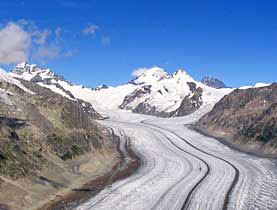
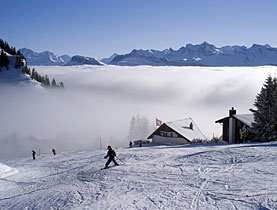
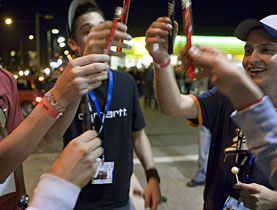
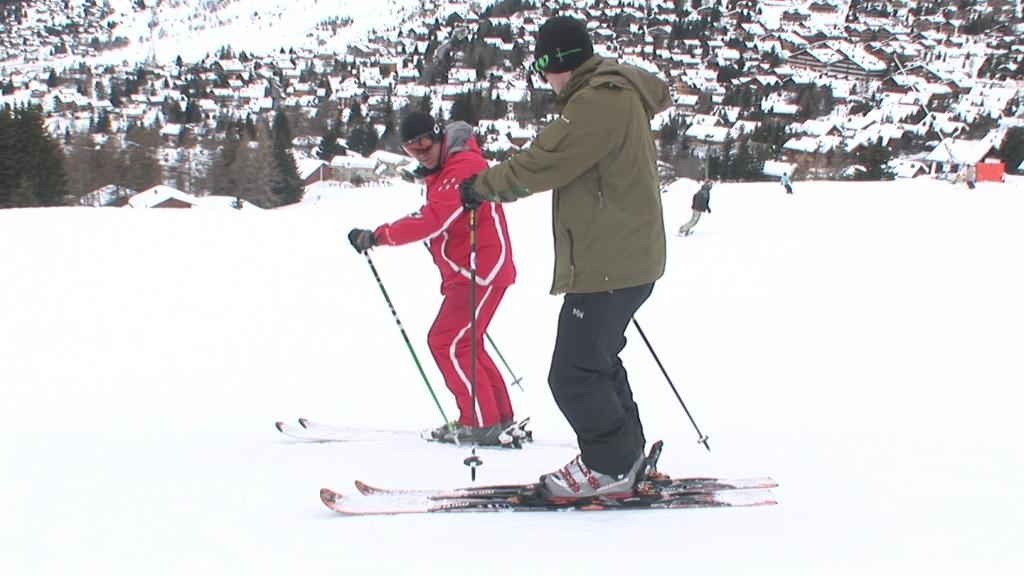
You can find an overview of ongoing debates with our journalists here . Please join us!
If you want to start a conversation about a topic raised in this article or want to report factual errors, email us at english@swissinfo.ch.